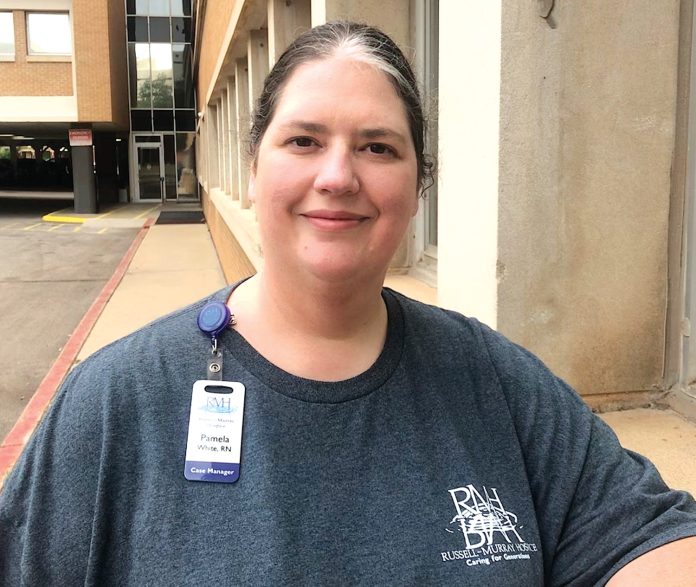
Story and photo by James Coburn, Staff Writer
Hospice eases confusion and uncertainty by making the transition more comfortable as death nears, said Pamela White, RN case manager, Russell Murray Hospice, located in midtown Oklahoma City. For families and patients, their expectations and planning become clearer.
“Having been on both sides I can see,” White said.
Hospice makes a world of difference with the quality of life. White has never had a patient who didn’t tell her the difference hospice made for them. Otherwise, many hospice patients wouldn’t have the resources to plan for special occasions with family members or friends.
“Pain management is huge, especially with cancer and ALS. You’re helping them with their breathing, their shortness of breath, their air hunger and all those things that make you miserable day-to-day,” White explained. “And we can control those symptoms to the best of our abilities. We can’t always fix it. But we can make it where you can visit with your friends and family or go to that graduation if you want to. We try to make those things happen.”
Some hospice patients do not have families and many of their friends may have passed away. But they are not alone, White said. A common remark she hears from patients is that they don’t want to die alone. They want someone by their side.
“We’re going to do our best to do that,” White said.
Some people depart from life during their sleep. White cannot always predict exactly when someone might pass away but will offer them the option of going to a hospice house or a facility where they will not be alone. However, she can identify general changes of decline to let family members know the time of passing is approaching. There is a decreased appetite and increased fatigue depending on a diagnosis. When only days or hours are left, there usually is a color change in one’s hands and feet. The hospice patient may become cool to the touch or fluctuate, White said. They might stop eating or drinking or merely take sips.
“Usually, they are more tired at that point in their life and they’re just ready to rest,” she explained.
She is quick to point out that she has witnessed several graceful transitions of departure from this life. A burst of energy is not uncommon during a person’s final hours.
“I have seen people sit up and wave up toward the ceiling like they’re waving to somebody from heaven or something,” White said. “They will have full and long conversations. I don’t understand because I’m only hearing part of it, but it’s really interesting to see.”
One of her patients had a dog that died shortly before them. They began petting the dog as if it was there. Maybe they were confused, or their dog was really there.
“Who knows?” White said. “There’s so much more to this world.”
Hospice nurses are in great need as well as caregivers. Nurse aides help every day to keep hospice patients turned, be clean and comfortable while providing companionship.
White said that patience is essential in hospice care. Hospice nurses also need to be willing to answer the same questions repeatedly. Patients may be scared, and forgetful and family members might have stress overload. Nurses must understand procedures for palliative care and respond to each situation with compassion, White said.
“Have a willingness to learn and be flexible because you never know what the day is going to bring you,” she continued.
Her workday might begin slowly and suddenly three hospice patients, or their primary caretakers notify Russell Murray Hospice of emergencies. Being flexible as a nurse and willing to change course is important.
White is grateful for being able to help patients during their times of need. Hospice answered her calling to be a nurse. She set her course to become a nurse early in life. She earned her LPN license at Mid-Del Technology Center during high school and five years ago graduated from Rose State College to become a registered nurse. And, she has been with Russell Murray Hospice throughout her career.
Her coworkers keep her engaged in a friendly environment. The nurses communicate closely together in the office and have each other’s back when challenges come, she said.
“That’s a wonderful thing and you don’t see that everywhere,” White said. “Just being able to be there for the families and the patients in this trying time of their lives is rewarding by itself, being able to be there when they need that extra care and spend that time with them.”
Visit https://rmhospice.org/ to become part of the Russell-Murray Hospice team.












